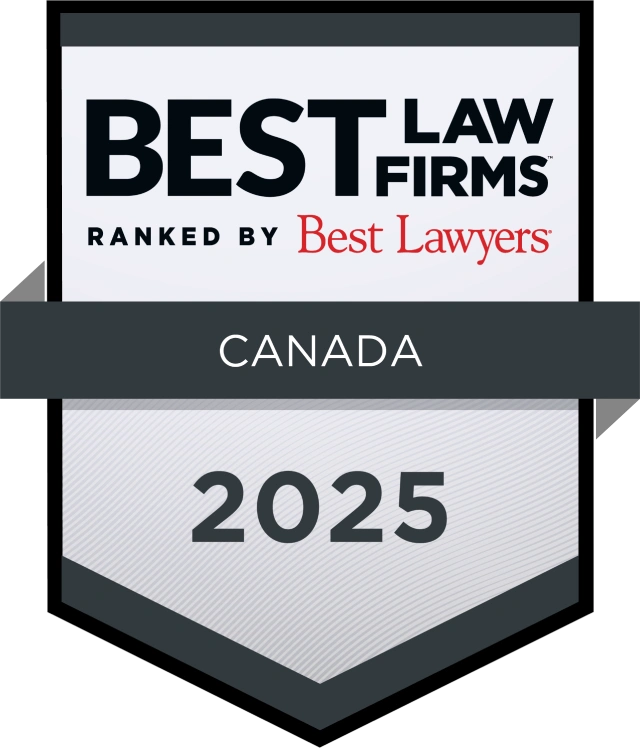Edmonton Personal Injury Lawyers
Get legal answers now. Speak to our lawyers.
Speak with our Edmonton personal injury lawyers and get legal answers to your personal injury questions.
Table of Contents
No matter how severe, personal injuries can cause major disruptions to your life. The negative effects of unexpected injuries can be wide-ranging and impact things like your physical, psychological and financial well-being. In Edmonton, people sustain injuries in all manner of accidents, and in many cases, other people may be at fault for those personal injuries. Even if it is not immediately apparent to the injured victim in the aftermath of their accident, many traumatic events that cause injuries requiring hospitalization are the result of another party’s negligence. Various people and organizations can be considered negligent if they fail to uphold a duty of care they are legally required to provide to others.
For example, in accordance with the provincial Occupiers’ Liability Act, anyone who owns and/or oversees commercial or residential properties is required to take the safety of lawful visitors into consideration when maintaining their premises. If a property’s occupier knows that a hazard or maintenance-related defect on the premises poses a risk to the safety of others but fails to take any action to properly address it or warn guests about it, they might be considered negligent. If their negligence leads to a traumatic event in which one of their visitors is injured, the at-fault party might be responsible for providing the aggrieved guest with compensation for their damages.
Similarly, the people who operate motor vehicles throughout the province are required to abide by the rules legislated by Alberta’s Traffic Safety Act. That means all drivers owe a duty of reasonable care to other road-users, including other drivers, their passengers, motorcycle riders, pedestrians, cyclists, and others. Engaging in any kind of unlawful conduct behind the wheel is considered negligence. For example, if a driver exceeds the posted speed limit, operates their vehicle under the influence of alcohol and/or drugs, ignores traffic signs, drives distractedly, or violates any other rule of the road, their negligence could cause a collision in which another road user sustains a range of injuries. If their wrongful actions lead to an injury-causing accident, the at-fault party should be responsible for providing injured parties with financial compensation.
In 2021 alone, the City of Edmonton saw over 1,600 accidents that resulted in injury or fatality. This statistic does not include fall injuries occurring on public and private property. If you have sustained a personal injury in Edmonton, you may be eligible for compensation for your injuries. For legal help, contact our Edmonton personal injury lawyers for a free initial consultation to see what options you may have if you have been seriously injured.
Types of personal injury claims our Edmonton personal injury lawyers can help with
At Preszler Injury Lawyers, we have successfully represented Canadian families since 1959 with their personal injury claims. Our Edmonton personal injury lawyers believe that no one should be forced to pay the price of someone else’s negligence. And yet, countless injured accident survivors in our community find themselves struggling to keep up with the rising costs associated with the injuries they have sustained.
We can seek compensation on your behalf in a wide range of cases. These include, but are not limited to:
- Car accident claims
- Slip and fall claims
- Dog attack claims
- Snowmobile accident claims
- Airplane accident claims
- ATV accident claims
- Institutional abuse claims
- Motorcycle accident claims
- Motorized bicycle accident claims
- Bicycle accident claims
- Pedestrian accident claims
- Truck accident claims
- Boating accident claims
- Physical Assault
- And more
If you have been injured because of someone else’s negligence in Edmonton, call us today for a no-hassle and initial free consultation.
Let us put our experience to work for you
Tell Us What Happened
We are here to help Albertans get the compensation and benefits they deserve after being injured in an accident. We take this responsibility very seriously. Book your free call with our personal injury lawyers today and let us help you.
Our phone lines are open 24/7.

Types of compensation available in a personal injury claim
The purpose of a personal injury case is to bring you back to the same position, had the accident not happened, and this is a responsibility our Edmonton personal injury lawyers do not take lightly. There are two main types of compensation in a personal injury claim. The first is pecuniary damages, which are meant to compensate you for the money you have or will lose in the future because of an injury. The second is non-pecuniary damages, also referred to as general damages for pain and suffering.
Pecuniary damages can include the following types of losses:
- Income loss. Lost income, benefits, and pension due to an accident.
- Future loss of earning capacity: An injury can change the direction of your job. This includes lost opportunities, future loss of income, and losing your competitive edge because of an injury. In many cases, this loss can be calculated until the age of likely retirement.
- Medical costs. This includes money spent on medical treatments, doctors’ appointments, ambulance, medications, and other medical devices.
- Future care. Medical treatments that you may need in the future due to accident-related injuries.
- Housekeeping expenses. If your injuries prevent you from doing your household chores as you did before the accident.
The word pecuniary means something involving money. But an accident can take more than just money from you and your family.
Non-pecuniary damages, also referred to as general damages, are intended to compensate you for your pain and suffering, emotional distress, and how the accident has and will continue to impact the enjoyment of your life.
The key to the fair assessment of non-pecuniary damages is to assess your level of impairment or how your pre- and post-accident life has changed. Here are some examples of things that may be considered:
- A change in the way you feel. This includes both physical and mental health
- Impact on relationships with your family and friends
- Activities that you used to do but are no longer able to. This includes sports and other recreational activities
- Being less interested or motivated in your career or education due to your injuries.
- And more
A common litigation strategy used by the insurance defence is to argue that your injuries have little or no impact on your life. But our lawyers will work alongside medical experts, vocational experts and other experts to help prove your case in the event you are truly injured and impacted. This is one of the reasons why it’s important to have an Edmonton personal injury lawyer on your side.
How to establish liability in a personal injury claim?
Liability means the legal assessment of fault. This is one of the starting points to assess the viability of a personal injury claim. If you are 100% at fault for an accident, you generally would not have a case. If you are found partly responsible for causing an accident, your claim value can be reduced. For example, if you are found to be at fault for 50% of an accident, your claim value could be reduced by 50%.
If you are involved in any type of accident, it is important to collect as much information from the scene. For motor vehicle accidents, this includes taking photographs, collecting information such as the names, contact details, and insurance information from other drivers. It is also important to note the names and contact information of any potential witnesses. For other accidents, such as slips or trips and falls, it is important to take pictures of the hazard.
In car accident cases, even if the other driver is charged by the police, it does not mean there is an automatic finding of fault in a civil lawsuit. An Edmonton personal injury lawyer can help with investigating and proving liability. It starts with collecting evidence such as witness statements, videos, pictures, and police records. In many cases, it is important to bring the at-fault party to a questioning for discovery after the lawsuit has been filed with the court. This is a process where your lawyer asks the opposing party or parties questions about how the accident happened, and their answers become evidence in the case. If necessary, our Edmonton lawyers can also help with retaining a forensic engineer who can provide an expert opinion on what is likely to cause an accident. Building a strong case on liability can motivate defendants in a lawsuit to try and settle your case outside of court.
Liability is not always straightforward. This, among other reasons, is why it is recommended that you speak with a personal injury lawyer as soon as possible. At Preszler Injury Lawyers, we have in-house investigators who can immediately assist with collecting crucial and often time-sensitive evidence. Call us today for your complimentary consultation.
How our Edmonton personal injury lawyers can help you get the compensation you deserve
The step after assessing liability or fault is the assessment of damages. This means considering what pecuniary damages (see above) apply in your case and how to value your pain and suffering. The evidence required to assess the value of your case may include:
- Medical records
- Employment and tax records
- Testimony from questioning for discovery
- Witness statements
- And more
Accidents do not only happen to people with a clean bill of health. If your injuries overlap with a previous injury or medical illness, it doesn’t mean you don’t have a case. We often retain specialized medical experts who can conduct a physical examination, take an oral history, and review your medical records before providing a report on what injuries specifically were caused by an accident, what treatment you might require, and what your diagnosis and prognosis for recovery will likely be. Prognosis, meaning the forecast of your injuries, is important to know since you only get to settle once – this is about your entire life, not just the time that has passed since the accident.
After collecting this evidence, looking at previous court cases involving similar injuries and impairments provides a guide to assessing what a fair assessment of your pain and suffering might be. Pecuniary damages, such as past and future income loss, are fact-specific. In cases where an income loss calculation is not simple, such as for business owners, it is common to retain a forensic accountant or economist to provide projections of what you or your business could have earned had the accident not happened.
Contact our Edmonton personal injury lawyers for a free consultation
At Preszler Injury Lawyers, we have been representing Canadian families for over 60 years in their pursuit of fairness and justice after life-altering injuries. We do our best to reduce the financial barriers to accessing our legal services. Our Edmonton personal injury lawyers provide a free initial consultation to all prospective clients. What’s more, our personal injury lawyers work on a contingency-fee basis, which means our clients don’t pay anything unless we win.
If you were injured because of someone else’s negligence, our Edmonton personal injury lawyers are available to provide you with a free consultation. To receive a free case assessment and to learn whether you might be able to seek compensation for your injuries, call us today.
Do you live in Edmonton? Here’s how we can help:
Notable Achievements
Awards and Recognitions
Proud to be one of Canada’s oldest personal injury law firms. The firm was founded in 1959 and has now grown to numerous offices across Canada. We have cumulatively secured over $1 billion for thousands of Canadians and are proud to maintain a high standard for our professional services without compromising on care or compassion.
Read More On personal injury Claims
Here are some blogs on personal injury claims.

personal injury
|
September 3, 2025
Understanding Spinal Cord Injuries
Spinal cord injuries can be life-altering. Because the spinal cord carries signals between the brain and the rest of the body, damage to it often…

personal injury
|
September 3, 2025
What Is Post-Concussion Syndrome?
Most people think of a concussion as a temporary injury. With rest and proper care, symptoms often improve within a few weeks. But for some,…

personal injury
|
June 5, 2025
Catastrophic Injuries in Alberta
Catastrophic injuries are very serious injuries that impose lasting consequences. For legal purposes, catastrophic injuries are defined in Alberta as permanently damaging to the victim’s…
Watch Our personal injury Videos
Check out our video series where we break down many interesting topics about personal injury claims in Alberta.
Commonly Asked personal injury Questions
Here are our most asked questions on personal injury claims.
What if I do not win the case? Do I owe any money?
We only charge fees if we are successful in your case, and we will never charge you back for expenses incurred in an unsuccessful case.
When should I contact a lawyer?
If you are asking this question, you should contact a personal injury lawyer. We provide free consultations with no obligation. If you think you have a situation where a personal injury lawyer might help, call us and ask!
Does your firm also represent insurance companies?
No. Our lawyers only represent accident victims and never insurance companies.
How do I pay for a personal injury lawyer?
Our personal injury lawyers do not require payment until after settlement. Then, the fees are payable out of the proceeds of the settlement. If there is no settlement, we do not charge a fee.
How can I help my lawyer with my case?
Our personal injury lawyers know the law and what evidence is important in your case and will fight for you. Insurance companies also know the law and what evidence is important, but they are fighting against you. Our personal injury lawyers will deal with the law and the insurance companies and let you focus on your health and treatment.
How long does it take to settle a case?
A case can take months to years to settle, depending on the severity of your injuries and the complexity of the case.
What are the different types of compensation I can get in a claim?
In personal injury claims, you can claim damages for the following:
- Pain and suffering;
- Loss of earning capacity, both past and future;
- Out-of-pocket expenses;
- Future cost-of-care; and
- Loss of housekeeping capacity.
What is a statute of limitations?
If you want to sue somebody, in most cases, you have a time limit. If you do not file your lawsuit in time, your legal claim is extinguished. These time limits are set out in various statutes (laws). A law that sets down a time limit to start a claim is known as a statute of limitations. It is very important to know the time limit to start your claim. If you miss that deadline, your claim can no longer be pursued.
When will I be compensated after I settle a claim?
After a settlement, it typically takes between 4 – 6 weeks before you receive your funds.
How will the strength of my case be determined?
Each lawsuit has a number of legal elements that must be assessed to determine the strength of the whole lawsuit. Our lawyers assess these elements and use the proper evidence to prove them. We will be honest and upfront with you about the strengths and weaknesses in your case.
Do I need to go to trial?
The vast majority of cases are settled before trial. In the cases that go to trial, the plaintiff usually makes a decision to go to trial after turning down an offer to settle from the defendant. However, there are cases where the defendant does not offer sufficient money to settle the case, and the only fair way to get the compensation you deserve is to go to trial.
Does it cost me money when we talk on the phone or meet?
No! Since we work on a contingency fee that is a fixed percentage of the settlement, we do not charge you for phone calls or meetings. This means you can feel confident in picking up the phone or meeting with your lawyer without worrying about how much you are being charged.
Do I have to pay anything upfront?
No. We only charge a fee after we have successfully won your case. In addition, we will cover the expenses of the lawsuit along the way and claim those back as part of the settlement. You do not have to pay anything upfront.
What is a contingency fee?
A contingency fee refers to a fee that is payable after settlement and is calculated as a percentage of that settlement.
Is there a time limit for making a personal injury claim?
Yes. There can be various time limits associated with making a personal injury claim. The most common time limit is the two-year limitation period set out under the Limitations Act, RSA 2000, c L-12. This limitation period can be suspended in some cases, particularly when minors or people with a legal disability are involved. In addition, there are sometimes important notice periods where you must notify a defendant, such as a municipality, with a much shorter period.
Do I need to pay taxes on my personal injury settlement?
No. Personal injury settlements are not “taxable income” for the purposes of your tax obligations. This is true even if the personal injury claim has wage loss components, and those wages would have been taxable income.
I am partially at fault for my injury, can I still make a claim?
Yes. It is called contributory negligence if you are partially at fault for your injury. Your claim is reduced by the percentage of fault attributable to your fault. However, you can still make a claim against other at-fault parties.
How is a personal injury claim valued?
A personal injury claim is valued by assessing the quantum of the case against the risk of no or partial liability.
The quantum of a case is based on how much pain and suffering, wage loss, out-of-pocket expenses, care costs, and housekeeping capacity have been incurred. Liability is based on the chances of success against the defendant and the chances of some liability being put back on you.
Do all personal injury claims go to trial?
No. In fact, a very small percentage of personal injury claims go to trial. The vast majority settle somewhere along the path from commencement to trial.
Can I change lawyers before my case settles?
Yes. Choice of counsel is a legal right. In contingency cases, when deciding you want to change lawyers, the new lawyer will obtain the legal file from the old lawyer and pay out any disbursements incurred to date. Then, upon settlement, the legal fee (usually a percentage of the settlement) will be the same whether you switched lawyers or not, and the two lawyers will work out among themselves what a fair split of that fee is based on who did what.
Can a settled personal injury claim be reopened?
Settlements are binding and final, with very few exceptions. The law has developed to provide as much certainty as possible when cases are resolved. This means that a settlement is almost always final. The situations where a settlement may not be binding are those that involve fraud, duress, undue influence, or an unconscionable settlement. These situations are rare, but if you believe one of those applies to your settlement, you should contact a lawyer.
Does going back to work hurt my case?
Going back to work affects your case. As wage loss is a part of your case, there is a link between how long you are off work and how much your claim is worth. However, this does not mean it hurts your case to return to work. It helps illustrate what your case is for everybody. Even if you ultimately cannot return to work, it is valuable to try to go back. If you cannot return to work, your case will be stronger if you try.
Can I go back to work if I file a personal injury claim in Calgary?
Yes. A personal injury claim does not dictate how you live your life. Our personal injury lawyers will look at how the injury affected your life when making your claim. How long you are off work will affect your claim, but the fact that you have a claim is not a deciding factor in your return-to-work journey. Your job is to go to treatment, get better, and get back to work and your regular life as soon as possible.
Why hire a personal injury lawyer for a personal injury claim in Calgary?
Personal injury claims can be complicated. We have an adversarial system in Calgary, which means the insurance company against whom you are making a claim has interests that are opposed to yours. The insurance company can use the law to its advantage to oppose your claim. Insurance companies are sophisticated litigants. A personal injury lawyer can level the playing field between you and an insurance company.
What if I have a pre-existing injury?
Pre-existing injuries make lawsuits more complicated and increase the need for legal help. Insurance companies will use a pre-existing injury as a defence against your claim to the full extent of the law. A personal injury lawyer can help frame the realities of a pre-existing injury to benefit your case. For example, if you have a pre-existing injury, then you are more likely to be injured in an accident than a healthy person.
What if I need treatment? How can I obtain it if I don’t have insurance or money to pay?
If you are injured in an accident, attending to treatment is important for your health and the legal claim. Unfortunately, in situations where there are no benefits covering treatment, you might be in a position where you cannot afford it. The insurance company against whom you are making a claim can voluntarily assist with treatment, though they have no legal obligations to do so. In some circumstances, treatment can be obtained on credit, with a promise to pay the provider at the time of settlement.
What is involved in a personal injury claim?
A personal injury claim involves numerous steps. Along the way, the parties can settle. The first steps involve giving the defendant notice of the claim and collecting documents and witness information. If the parties cannot settle, you must file a lawsuit in court to go further. That triggers a lot of rules and obligations under the court’s rules. A case will go to trial if it is never settled.
What is negligence, and why is it important in a personal injury case?
Negligence is a cause of action that arose in common law over the years. The law of negligence requires everyone within the jurisdiction to take reasonable care and not injure their neighbours. In this context, “neighbour” means anyone who might reasonably and foreseeably be harmed by your activities. If you are driving, that includes other users of the road. If you run a business, it means people who might come onto your premises.
HURT DUE TO SOMEONE ELSE’S ACTIONS IN EDMONTON?
Contact Our Lawyers Now
Serving clients across Edmonton
We handle all types of personal injury claims. Book your free case review today.



